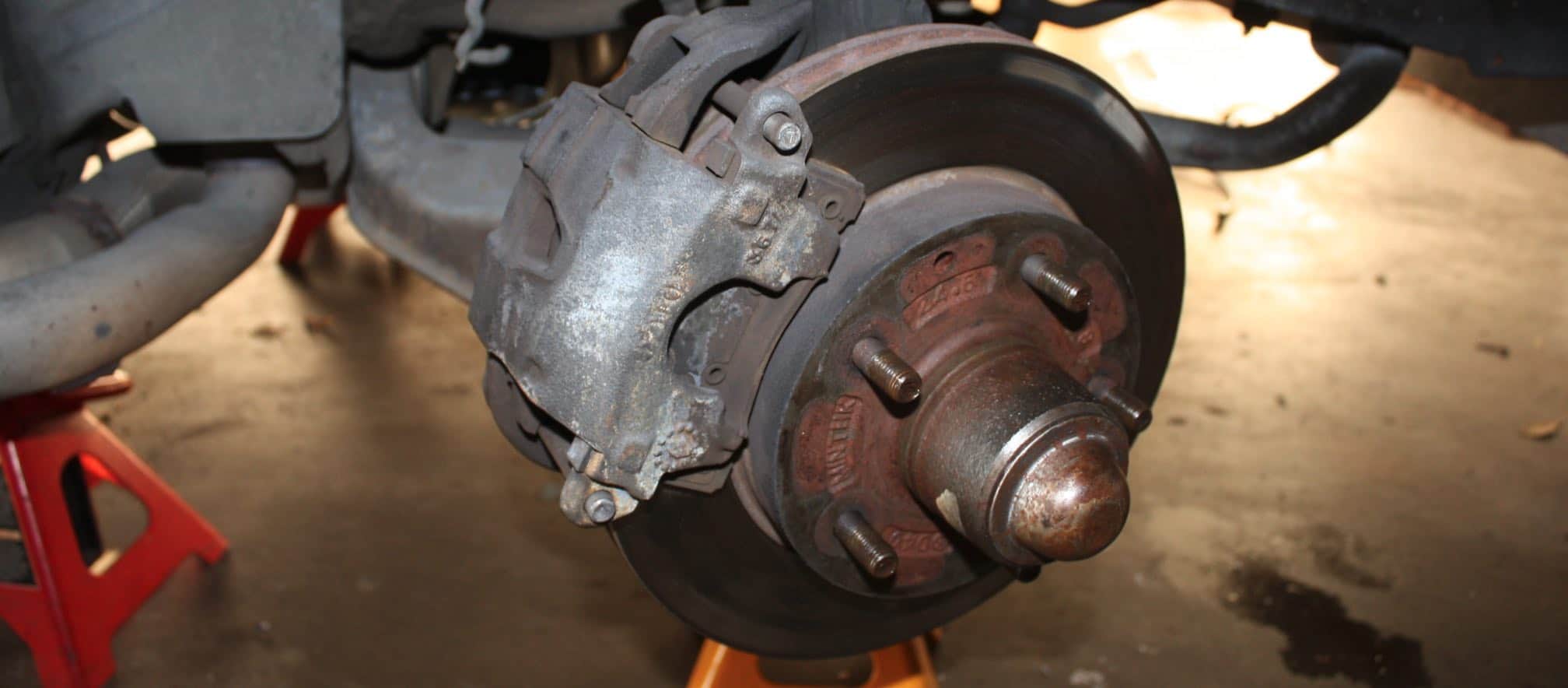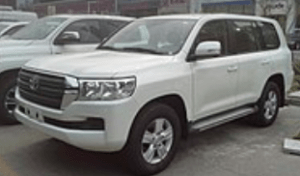Rotors are metal discs that are visible behind the Land Cruiser’s wheel. They work together with the calipers and brake pads to slow down your Toyota Land Cruiser.
Due to braking friction, rotors have to withstand and dissipate a tremendous amount of heat. This causes the rotor surface to be uneven making the brake pedal feel jittery, and the brake system less efficient. This is known as warping. Warped brake rotors are far less effective at stopping fast if you need to slam on the brakes. Nearly every vehicle has disc brakes up front. Your Land Cruiser may have drum brakes on the rear though.
Table of Contents
1. Symptoms
2. Causes
3. Prevention
4. Conclusion: Land Cruiser Warped Rotors
Warped Rotor Symptoms: Toyota Land Cruiser
Rotors are generally smooth and flat and if they are warped they can display the following signs:
- Noisy brakes– warped rotors contact brake pads at uneven intervals producing a squeak, squeal, or a scraping sound. The noise can range from a rhythmic thumping to pitchy groaning hum.
- Pulsating brakes– worn rotors can produce excessive vibrations felt in the pedal (for more see this article on shaking when braking). That could be because the warp is causing a hydraulic pressure surge that runs backwards through the master cylinder and into the pedal.
- Increased stopping distances– warped rotors can inhibit their capacity to slow the vehicle. This occurs because your brake pads clamp onto only a portion of the surface of the rotor at any time. This smaller contact area means longer stops when the brakes are applied.
- Grooves or score marks– the visibility of stress cracks, score marks, high spots or grooves on the surface of the disc indicates excessive heat and wear. Eventually the brakes will start to grind.
- Pulsating steering wheel – if you brake at high speed, warped rotors may cause the whole vehicle to shutter. Warped front rotors will cause steering wheel vibration while the rear ones will cause pulsation on the seat or coming from the back of the vehicle. There are a few different causes of a shaking steering wheel. Here’s a more in depth guide.
Land Cruiser Warped Rotor Causes
Here are the most common reasons your Land Cruiser may have warped rotors:
Driving habits
Driving down a hilly terrain or during the rush hour traffic requires a lot of stopping. This can take a toll on the performance of the brake system by building up excessive heat in the rotors and causing them to warp.
Incorrect fitting
Anytime a wheel is installed and isn’t torqued up properly, it can put stress on your Land Cruiser’s rotor. Also, if the lug nuts are tightened unevenly, they can lead to the brake discs warping.
Damaged wheel bearing
A worn out wheel bearing may not necessarily bend the wheels but it can cause them to wobble. This will lead to inconsistent brake pad wear and warped rotors.
Malfunctioning brake calipers
Brake calipers work by squeezing the rotors together. If the calipers malfunction, they can exert too much stress on an overheated brake motor. That causes the rotor to go off-balance leading to its warping.
Brake system issues
If the rear brakes aren’t working, for instance, the front ones will work harder, heating up the rotors. Also, if the shocks are not performing properly, they can shift excessive weight to the front design brake system causing the rotor to warp.
Sudden braking
While driving, you may sometimes be forced to brake suddenly from a high speed. The friction generated can cause a level of heat enough to cause the rotor to warp.
Extended parking
A Land Cruiser that has been parked for an extended period can build up surface rust. It is crucial to note that any uneven surface of more than 0.005 inches can be felt as a rotor warps whenever you apply the brakes.
Wear and tear
Rotors are designed with a specific thickness. But, over time, the metal is exposed to repeated contact with the pads and excessive heat making it soft and susceptible to wear and tear.
Warped Rotor Prevention
Here are some practical, actionable steps that you can use to help keep your Land Cruiser’s rotors from ever warping. One of the most important things that you can do is make sure that you are breaking the brakes in properly. Here’s a good article on that from Wagner: https://www.wagnerbrake.com/technical/technical-tips/break-in.html
Tighten the lug nut properly
The lug nut torque is essential when it comes to the rotors structural integrity. Hence, you should use a torque wrench to tighten the lug nuts. Tightening evenly all the lug nuts on every wheel ensures maximum rotor life.
Brake installation
After brake pads installation, you should make sure that they are broken in properly. This will ensure that the pads don’t leave materials on the rotor during hard braking and consequently prevent warping. Make sure that you get a good set of rotors when they need replacing.
Braking practices
To prevent the rotors from being glazed over, be mindful of how much braking the vehicle is doing. For instance, when driving downhill, you should control the speed by shifting the transmission into a lower gear. Also, avoid “riding the brakes” lightly since this may generate excessive heat.
Conclusion: Warped Rotors Land Cruiser
The brake rotors are a vital part of the Toyota Land Cruiser’s braking system and therefore are critical to the overall safety and handling characteristics of the vehicle. Hence, you should take the necessary preventive measures to ensure a long lifespan of the rotors. But, if you suspect that the rotors are worn out or damaged, consult a professional technician who will inspect and determine if the vehicle needs a brake motor repair or replacement.
Your Land Cruiser’s ability to make a complete stop is diminished when you hit the brakes, the material from the brake pad has a smaller contact patch on the rotor. Over a period of time, it only gets worse. Don’t put off repairing them, you never know when you’re going to need to make a hard stop. It could just save your life.


